It’s time for independent insurance agencies to pave better pathways to leadership for women.
Though women outnumber men in entry-level positions in the insurance industry, the number of women in leadership roles is far smaller.
The reasons for this are complicated and interconnected. While insurance agencies are, by and large, great places for women to work, agencies can do more to level the playing field and empower women to reach their full potential. It’s ultimately in agencies’ best interests to do so, as research has shown that getting more women into leadership is good for business.
Our research on women in insurance agencies
In March 2022, Agent for the Future released The State of Women in Independent Insurance Agencies, which explored some of the unique challenges faced by women in insurance. The report also shared recommendations for how agencies and individuals can better support women.
For this 2023 update, our research team at Liberty Mutual and Safeco Insurance’s Agent for the Future surveyed more than 1,100 independent insurance agency leaders and team members, including 632 women. We also drew from external research and expert sources on women in the workplace to examine what insurance agency leaders and employees need to know to pave better pathways to leadership for women.
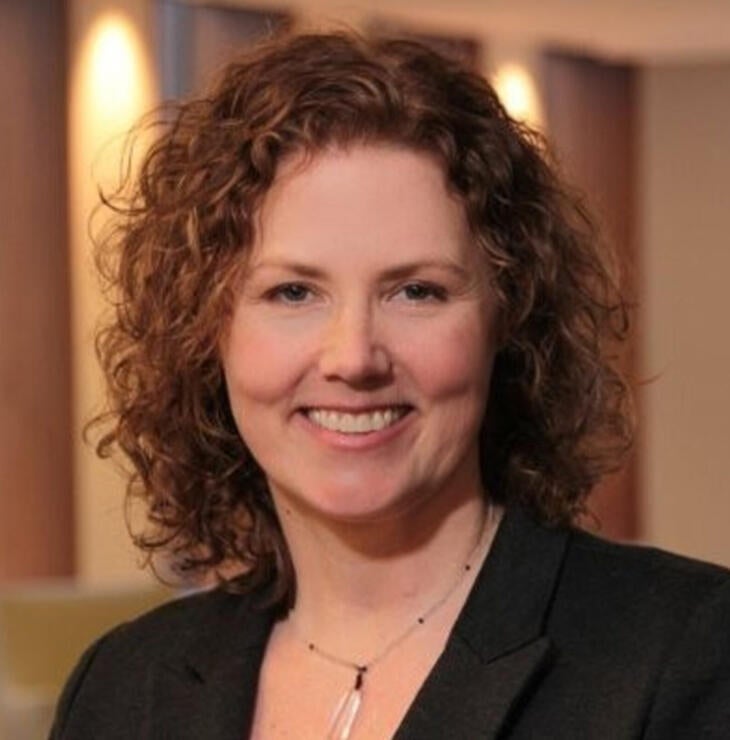
More women in agencies are ready to be leaders.
They are hungry to share their expertise and are uniquely positioned to connect with customers and transform their agencies.
When there are women in the room—at every level but especially at the leadership level—companies thrive. And with women making up more than half of agency employees, that points to a lot of opportunity for independent agencies.
Women are still underrepresented in agency leadership
Gender representation in insurance agencies has improved over the last few years. Between 2018 and 2022, the percentage of agencies with at least one woman in a principal or senior leadership role increased by 12%, rising to 47% of agencies, according to the 2022 Agency Universe Study.
However, a stark gender imbalance remains. While more agencies have at least one woman in leadership, men still outnumber women in leadership two to one. Our research found that women make up more than half of all employees in insurance agencies, but less than one-third of all agency owners and principals.
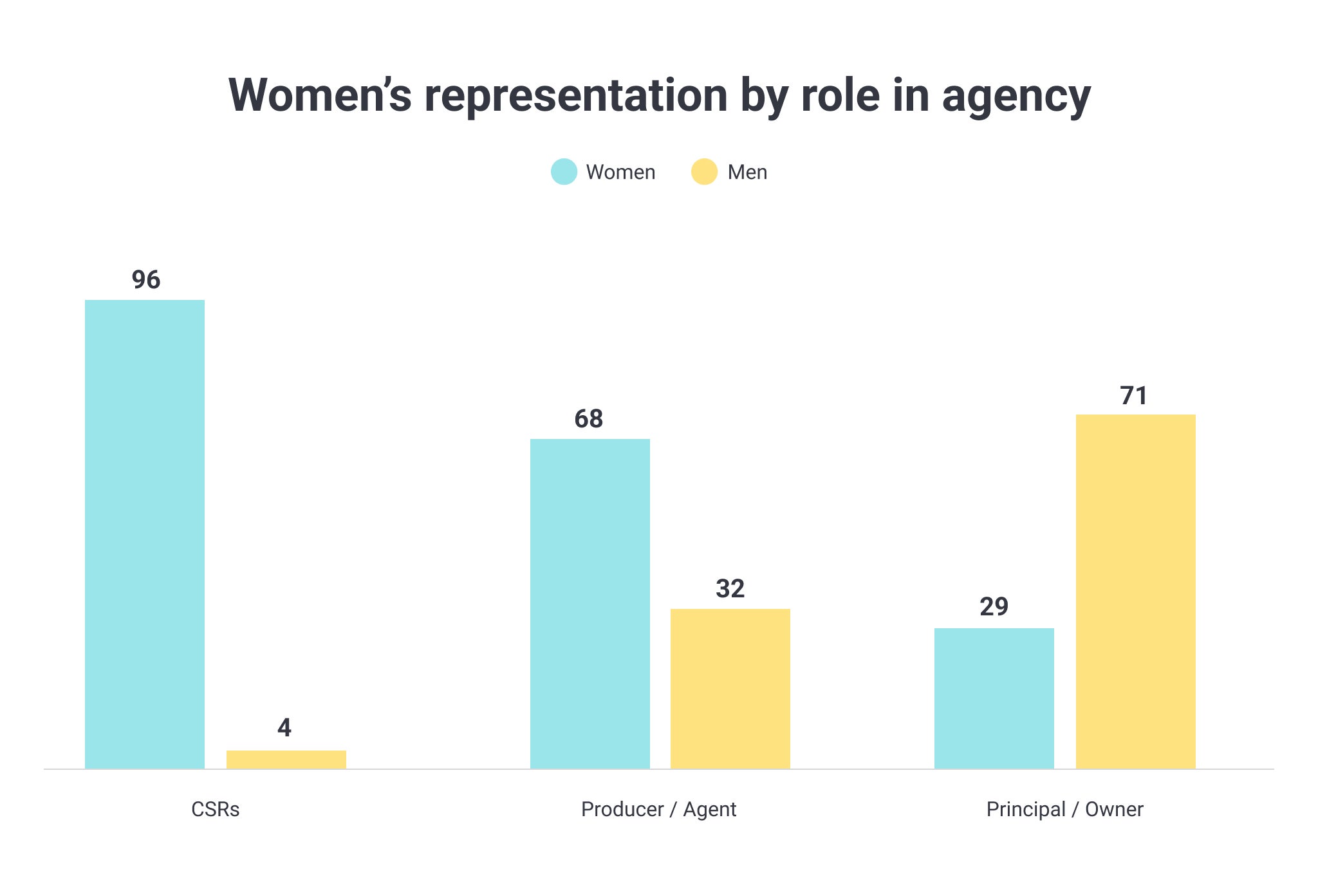
The “broken rung” on the corporate ladder
Our research found that insurance is susceptible to what McKinsey calls the “broken rung” on the corporate ladder. While male employees consistently get opportunities to climb the ladder, female employees often get overlooked for development opportunities and promotions.
Our research shows that women in agencies see the gap in leadership opportunities early on. Women are less likely than men to be excited about their future in the agency, less likely to say their manager is developing them for leadership, and less likely to say they have the skills they need to grow their career.
This is especially true for millennial and Gen Z women (those under the age of 41). While 80% of millennial and Gen Z men working in frontline roles said they are excited about their future in their agency, only 56% of women agreed. Also, more than half of millennial and Gen Z men said their manager is actively developing them for leadership, compared with 38% of women.
This suggests that current agency leaders are overlooking promising female employees at a pivotal point in their careers. Investing in developing young women can create opportunities that benefit everyone in the agency and help all employees reach their full potential. For example, getting more women on leadership tracks can help develop more great leaders who can perpetuate the agency.
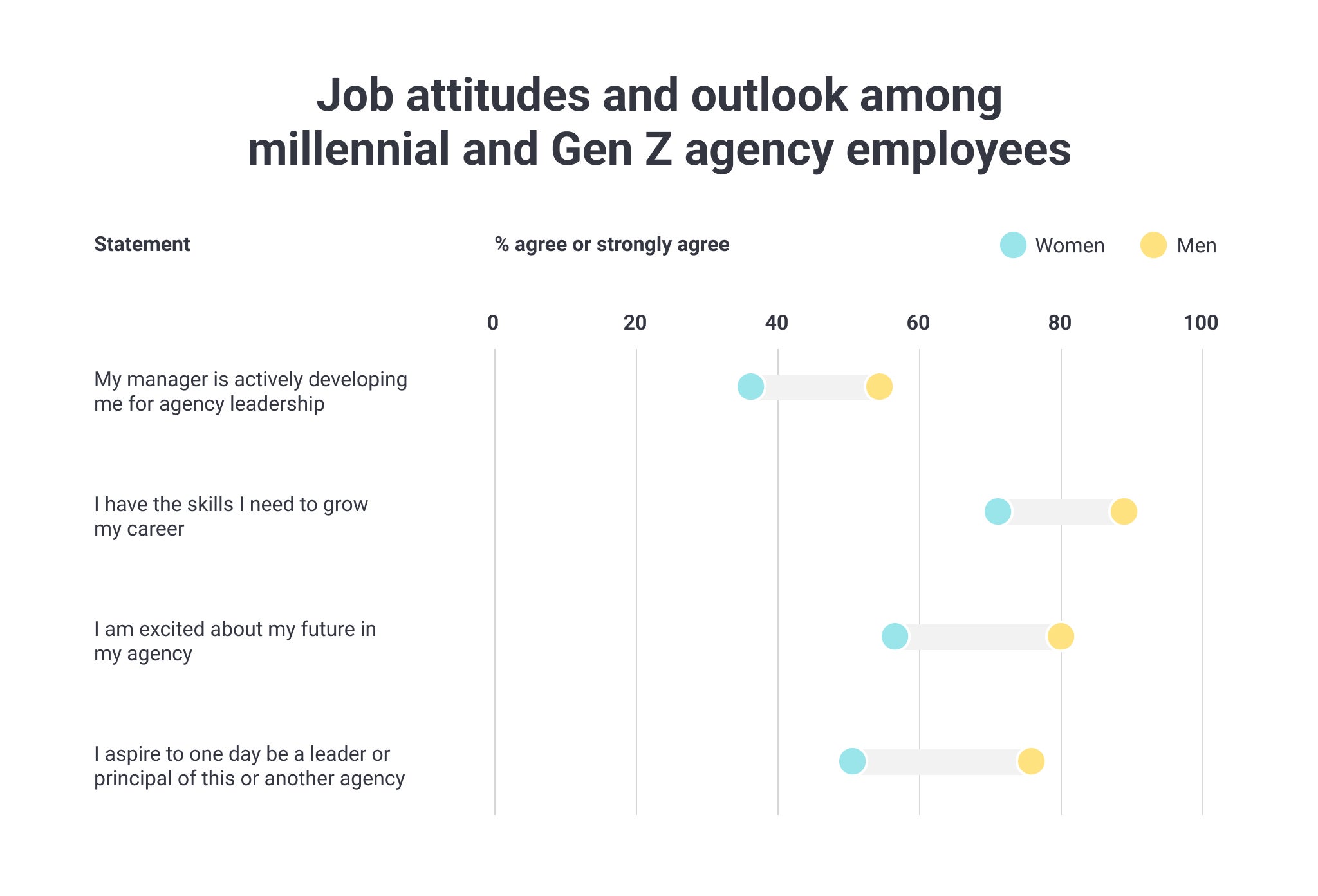
Exploring the aspiration gap
According to our research, 85% of women who work frontline roles can picture themselves as a leader at an agency. However, only 50% of millennial and Gen Z women are actively aspiring to be leaders in their agency – in contrast to 78% of men in the same age group.
Many factors, both systemic and individual, contribute to this gender gap in aspiration. Research has shown that women are less likely than men to self-promote, which means they may need someone to advocate for them and push them to take risks. As seen in the graph above, women in agencies are less likely than their male colleagues to say they’re being developed for leadership. And research from Harvard Business Review found that women are less likely than men to have sponsors to help them reach the top levels of leadership.
Perceptions of women in insurance leadership
There’s also the problem of who is perceived as a potential leader. In the insurance industry and other traditionally male-dominated industries, women often feel they have to prove themselves more than their male colleagues to reach the same level.
When we asked agency principals about the supporting factors on their path to agency ownership, 67% of women cited their years of experience in the insurance industry. Men were equally likely to cite their experience and their desire to own a business. This suggests that women feel they need more experience to get those top roles.
Once they do get into leadership roles, women often face imposter syndrome and comments that undermine their authority. The Women in the Workplace 2022 study from McKinsey and LeanIn found that women leaders are twice as likely as men leaders to be mistaken for someone more junior. They’re also more likely to say that personal characteristics, such as their gender or being a parent, played a role in them being passed over for a promotion or raise.

There are a lot of women in insurance, but not a lot of women in production or leadership positions.
I don’t think I’ve ever competed for an account against another female broker.
As a woman, I find it fairly easy to break through and get conversations started with business owners. But to win accounts, you really have to know your stuff. I feel women have to prove more than men that they are smarter and more knowledgeable than the competition (who is typically a male).
Keys for recruiting and retaining women
Women are demanding more from work. They also value different things in a workplace than men do — and aren’t afraid to leave get what they need. McKinsey found that women leaders are switching roles at higher rates than men if a company doesn’t offer the benefits and workplace culture they value.
Our research found that staffing is a top concern for independent agencies. Thirty-eight percent of agents say finding and recruiting staff will be a top challenge for their agency in 2023. With women making up more than half of the workforce in insurance agencies, it’s essential to find better ways to attract and retain current and future female leaders.
According to our research, women in insurance value flexibility, stability, parental leave and continuing education opportunities. They also want to work for agencies that are involved in the community.
Implementing these types of benefits, programs and values can help make insurance agencies better places to work for everyone.
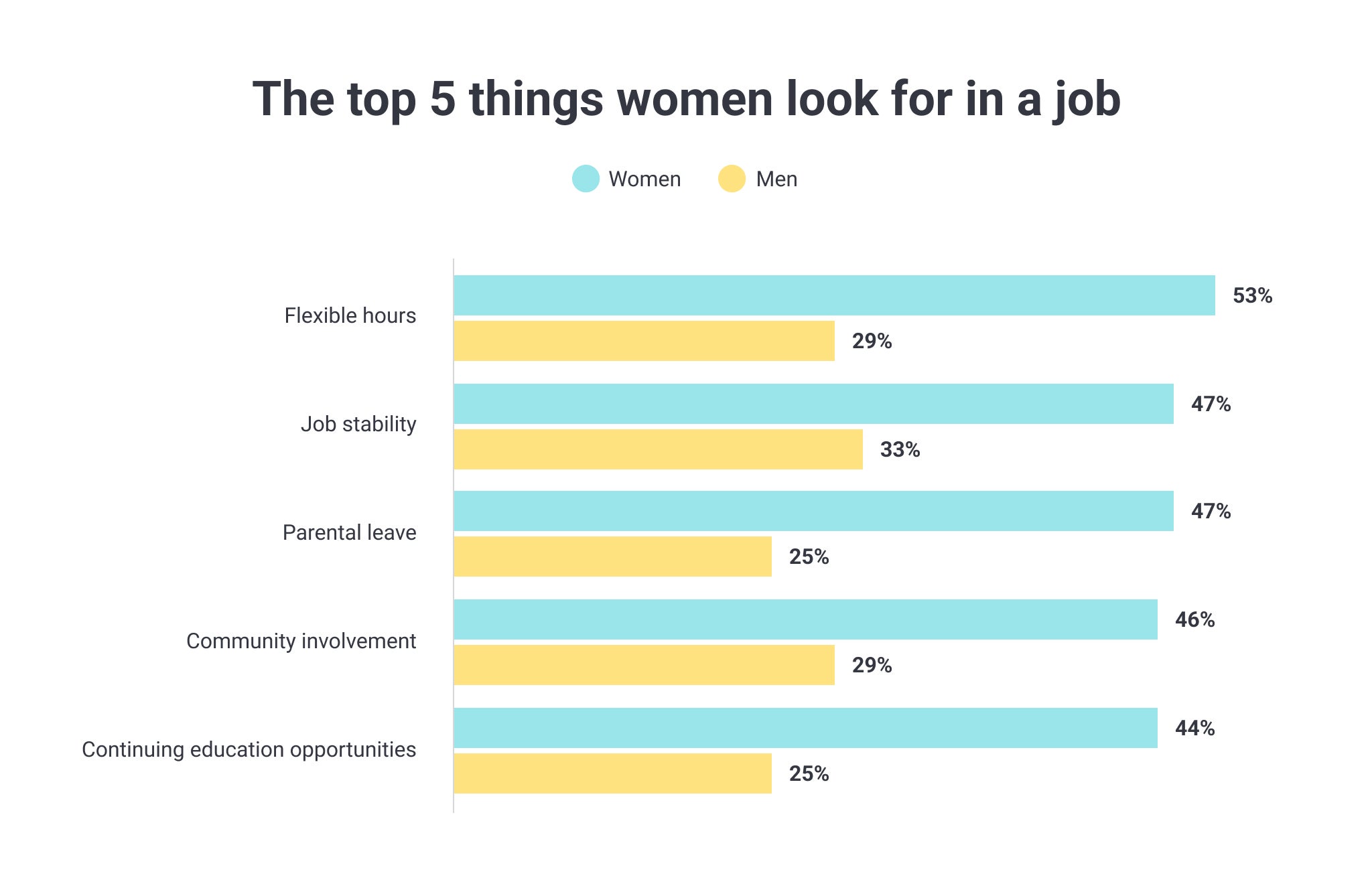
How caretaking duties can block access to leadership
Our research found that women in independent insurance agencies are more likely than men to be balancing caregiving with their careers. Women were more likely than men to say that they are currently primary caregivers or anticipate becoming one within the next five years.
Among non-principal agency staff members, nearly one in four employees is a parent to young children, including more than half of all millennial team members.
Women with young children are less likely than their male counterparts to say that they have a healthy work-life balance. They are also less likely to aspire to lead or say their manager is developing them for leadership. And they are less likely to make it into leadership – female principals are half as likely as male principals to have young children.
Becoming a parent or primary caregiver can be a pivotal point in a woman’s career. Caregiving responsibilities and the “motherhood penalty” can contribute to burnout and cause women to drop out of the workforce. McKinsey’s Women in the Workplace 2022 study found that women are more likely than men to take on most of their family’s housework and/or childcare. And while men take on less household labor as their careers advance, women’s household labor stays the same as they climb the ladder.
Flexibility remains key for retaining women
Of course, insurance agency leaders can’t change the imbalance in household labor. But they can do more to support working parents and caregivers.
To start, agency leaders may consider implementing more paid leave and childcare benefits. Greater flexibility can also help women navigate the complicated relationship between caregiving and career.
Agencies are well positioned to offer flexible schedules and remote work options that can benefit all employees. In fact, our research found that 77% of agency employees are satisfied with the flexibility their agency allows, and 92% of women in frontline roles say they receive flexibility when they need it.
Agency leaders would do well to remember that flexibility isn’t one size fits all. They should talk with employees about their individual needs and what level of flexibility would most benefit them.
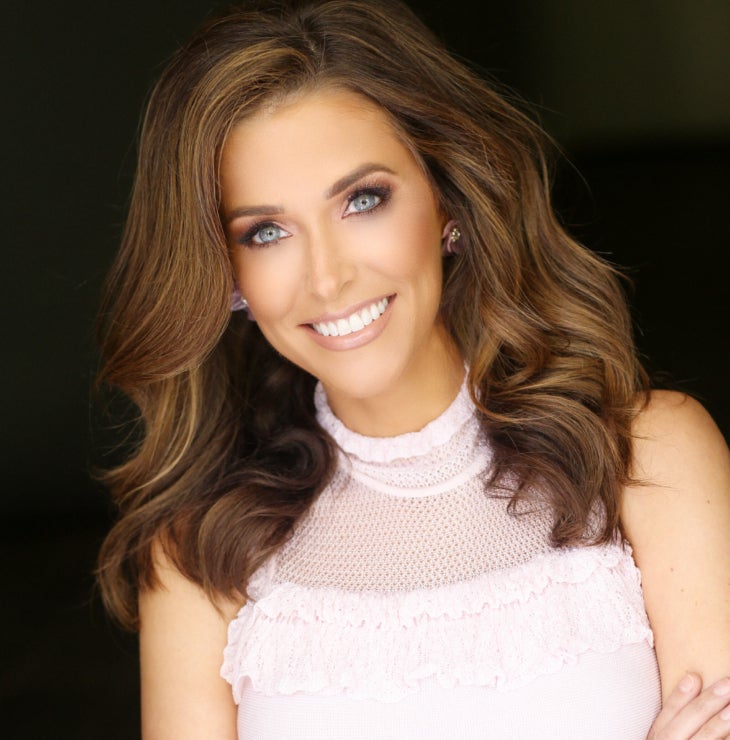
When women have children, they often fall into the default parent mode.
They’re the ones who do the school drop-offs or stay home with sick kids. It’s often the responsibility of the mother to try to juggle all that alongside work.
In our industry, we’re less likely to lose women if we provide them with more flexibility. For example, more flexible schedules allow them to be present with their family when they need to and do the things that are just as important to them as their careers.
I’m here because I was provided that flexibility. If we can provide women the possibility to balance work and home life without additional stress, we will help the growth of women in our industry.
How to create a brighter future for women in insurance
While women still face challenges on the path to agency leadership, there are plenty of reasons to be optimistic.
More agencies recognize the importance of diversity and inclusion, including hiring and promoting more women. Agencies are offering more flexibility and options to work remotely, which is especially beneficial for women, and most women in agencies are satisfied with the flexibility their agency allows.
Getting more women into leadership benefits everyone in the independent insurance agency system. Research from Harvard Business Review found that women outscored men on leadership skills, including building relationships, and other research revealed that women in management positions are better at consistently checking in on employees’ overall well-being and creating more human-centered workplaces.
All of this and more means women are uniquely positioned to connect with customers and drive transformation in agencies. Many women in independent insurance agencies are ready for leadership, and it’s time for agencies to pave better pathways to leadership to help them get there.
